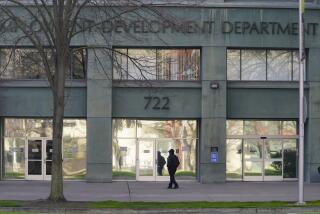2 Held in Raid on Identity Theft Ring
Underscoring concerns about the nation’s fastest-growing type of crime, the FBI arrested two people Wednesday and sought a third in what they described as an identity theft ring that used other people’s names to steal more than $700,000.
Federal authorities said that the three, using a host of aliases and addresses, masterminded the second-largest identity theft ring ever uncovered in the United States.
As agents made the arrests, federal and local authorities were across town, testifying at a congressional hearing on identity theft. They promised to do much more to combat it with legislation and increased law enforcement.
“Identity theft,” hearing chairwoman Sen. Dianne Feinstein (D-Calif.) said, “is perhaps the signature crime of the Technology Age.”
In morning raids, the FBI arrested alleged ringleaders Derrick Lionel Davis, 37, and Demond Lamont Walker, 31, both of Inglewood. A third suspect, Ramiah Latiece Lewis, 25, of Covina was still at large Wednesday night.
Authorities accused the three of stealing the names, addresses and Social Security numbers of more than 120 unwitting employees of the U.S. Army Corps of Engineers in Los Angeles over the last 18 months.
The FBI said it didn’t know how the three got the names, and that none of them had ever worked at the Army Corps office at 911 Wilshire Blvd., where the victims worked.
But once they obtained the names, they used them to get credit cards and go on spending sprees--buying everything from big-screen TVs and refrigerators to Victoria’s Secret lingerie, cellular phones and even a boa constrictor, FBI affidavits allege.
Although the amount taken from each victim was rarely more than $5,000, the costs of such identity thefts--financial as well as emotional--can be enormous, said FBI Special Agent Sherri Rost.
“The taking of someone’s personal identity can really ruin their lives,” said Rost, whose white-collar crime task force led the year-long investigation. “It can take years for them to rebuild their credit.”
As many as seven other accomplices are also being sought, but were not identified by the FBI, which was assisted by the U.S. Army Criminal Investigation Division.
Lewis, 25--and the boa constrictor--were believed to be hiding out in Louisiana.
Each of the three accused could face 15 years in federal prison if convicted.
Rost said the case marks perhaps the first time that federal statutes have been used to arrest and prosecute an organized identity theft ring.
Senate Panel Holds Hearings
That may soon change, Rost and others said, as the FBI and other authorities target a crime that until recently was almost unheard of--except to the many thousands of victims nationwide.
While most instances of identity theft are investigated by local authorities, Rost said the FBI is increasingly getting involved, thanks to a 1998 federal statute that makes it a federal crime to use someone else’s name to get credit cards and spend money.
At the U.S. Senate subcommittee hearing in Monterey Park, victims of identity theft testified that it is easy for someone to steal their Social Security numbers and other private information, obtain credit cards and run up huge debts in their names.
The typical victim of identity theft loses an average of $1,800 in bogus credit card charges but doesn’t learn about the theft until about 14 months later, the committee was told.
Mari Frank, an Orange County attorney, said she learned that her identity had been stolen when a bank representative called her in 1996, asking why she had not paid an $11,000 credit card debt. She eventually learned that an impostor had obtained several credit cards, cash advances and had even purchased a red convertible Mustang using Frank’s name.
“Once she got that first card, it started the whole craziness,” Frank said, explaining that credit card companies offered the impostor additional credit cards after the first fraudulent card was approved.
Victims and law enforcement officials said the crime is difficult to prevent because much of the information used to steal an identity--such as Social Security numbers--is available on the Internet for a nominal fee.
Authorities conceded that identity theft is growing far faster than any other type of crime. They said it is costing consumers--and the credit card companies that usually foot the bill--about $3 billion a year.
California leads the nation in complaints, and Los Angeles far outpaces any other city in the state, said Jeffrey Klurfeld, director of the Western regional office of the Federal Trade Commission, the national clearinghouse on identity theft.
In the last year, the number of cases reported to the county Sheriff’s Department more than doubled.
In response, Sheriff Lee Baca recently formed the nation’s first task force dedicated to investigating identity theft.
That hasn’t been enough, Baca conceded. He told the committee Wednesday that he hopes to expand the five-member team by adding investigators from the U.S. postal inspector’s office, the Secret Service, the U.S. inspector general’s office and the U.S. Treasury Department.
Feinstein said she plans to ask Congress for $15 million to create similar task forces in cities throughout the nation.
She has introduced legislation to make identity theft more difficult. If passed, it would prohibit the sale of Social Security numbers without the permission of the number’s owner.
The legislation would also require credit card companies to notify credit card holders if a request has been made to send additional cards or credit information to a new address.
More to Read
Sign up for Essential California
The most important California stories and recommendations in your inbox every morning.
You may occasionally receive promotional content from the Los Angeles Times.











